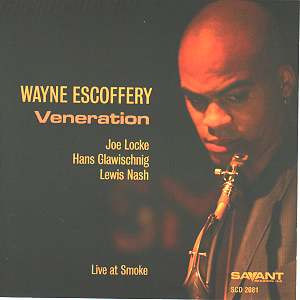1. Locke’s Vibe
2. I Waited for You
3. Bee Vamp
4. Skydive
5. Tell Me Why
6. Looking Ahead
7. Isfahan
8. Melody for Melonae
Wayne Escoffery - Tenor and soprano saxes
Joe Locke - Vibes
Hans Glawischnig - Bass
Lewis Nash - Drums
Wayne
Escoffery was born in London but he is now
established in New York, where he has played
with the Mingus Big Band, Ben Riley’s Monk
Legacy Septet and the_ Tom Harrell Quintet.
This CD, Wayne’s third as leader, was recorded
last year at New York’s Smoke Club when Wayne
was only 21.
The
album opens with atmospherically echoey notes
from Joe Locke’s vibes, as an introduction
to I Waited for You, which brings in
Wayne Escoffery who immediately stamps his
authority on the music. His tone is forceful
without being shrill and his playing has complete
authority. In fact he rightly gets the lion’s
share of the spotlight throughout this album,
although Joe Locke also gets plenty of notice
for his equally virtuosic and often startling
vibes playing.
Bee
Vamp is the first of two compositions
by Booker Little on the CD (the other is Looking
Ahead). It gives Wayne plenty of scope
for fiery improvisation, spanning the whole
range of the tenor sax. Joe Locke’s solo is
likewise exciting, backed by dynamic rhythm
from bass and drums. In fact “dynamic” is
the word which would describe all the playing
on this album. After stating the theme of
Skydive, Wayne hardly stops to take
a breath as he pours out huge swathes of notes.
For
Tell Me Why, Wayne switches to soprano
sax, where he seems just as comfortable as
on tenor. It’s the only original by Escoffery
on the CD. He wrote it when his mother and
his wife were both having a hard time, and
it captures sad, introverted emotions without
giving in to them. Joe Locke is also thoughtful
here, savouring the twists and turns of the
theme. The gutsy Looking Ahead is notable
for Escoffery’s straight-from-the-shoulder
tenor and Lewis Nash’s drum solo which makes
me smile at its technical bravado.
Isfahan
brings a change of mood and pace, with Wayne
making the Strayhorn-Ellington tune sound
different from its original interpretation
by Johnny Hodges: less lyrical and tender
but just as eloquent. This track is simply
a duet between Wayne and bassist Hans Glawischnig,
who is a constant source of stability amongst
all the unexpected turns taken by the three
other players.
The
album ends with Melody for Melonae,
a composition by Escoffery’s teacher and mentor,
Jackie McLean. It mixes a rather gloomy theme
(underpinned by bowed bass) with some very
adventurous solos from tenor sax and vibes.
Joe Locke’s habit of humming along to his
solos is particularly audible here, but it
adds to the exhilaration.
I
can thorougly recommend this album. At no
point is this background music: it demands
to be listened to. Wayne Escoffery is clearly
a name to watch.
Tony
Augarde
